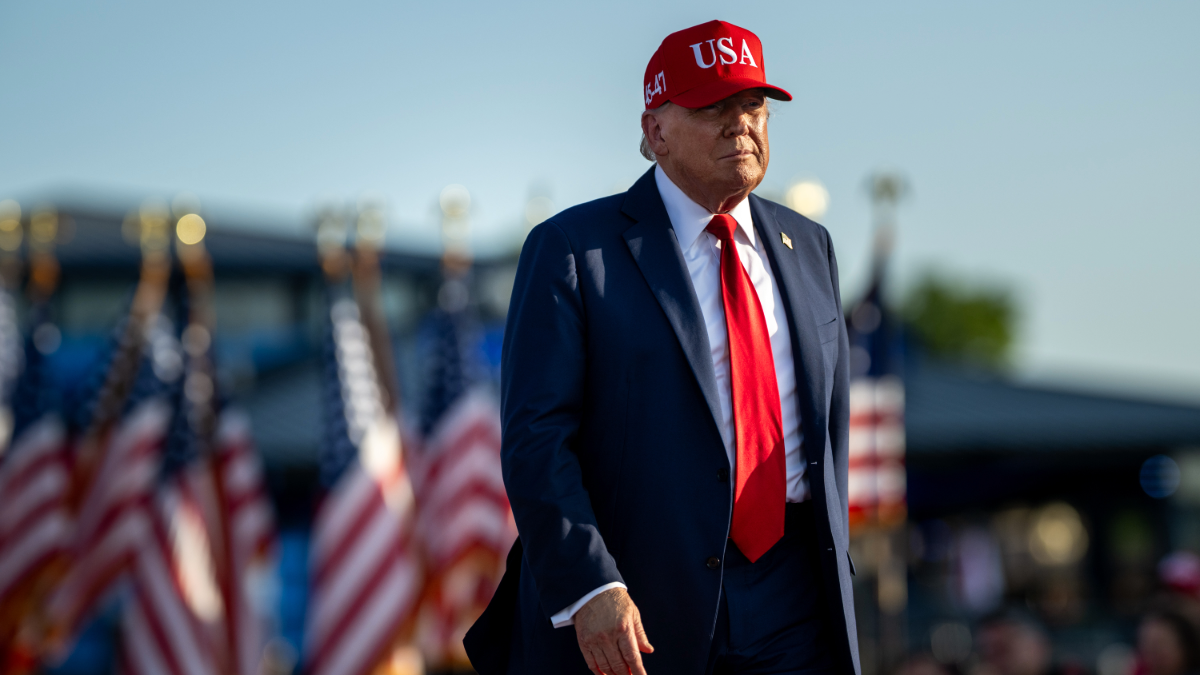Trump’s New Brazil Tariffs Aren’t About Trade, and They’re Not About Free Speech
Laís Martins / Jul 10, 2025Laís Martins is a fellow at Tech Policy Press.

US President Donald Trump arrives to the Salute to America Celebration, Thursday, July 3, 2025, at the Iowa State Fairgrounds in Des Moines. (Official White House photo by Daniel Torok)
On July 9, United States President Donald Trump announced that he was slapping 50% tariffs on Brazilian products starting August 1. But despite his justifications, delivered in his characteristic style, these tariffs are hardly about trade. They appear to represent another attempt by the White House to meddle with Brazil's sovereignty and rule of law.
In a letter addressed to Brazilian President Luiz Inácio Lula da Silva uploaded to his Truth Social account, Trump attributed his decision to apply tariffs “due in part to Brazil's insidious attacks on Free Elections, and the fundamental Free Speech Rights of Americans.”
A few hours later, President Lula published a statement on X in which he reaffirmed that “Brazil is a sovereign nation with independent institutions that will not accept being tutored by anyone” and vowed to reciprocate Trump's tariffs. “Sovereignty, respect and the uncompromising defense of the interests of Brazilian people are the values that guide our relationship with the world,” wrote Lula.
In a post on the social media platform Bluesky, University of California Irvine law school professor and former United Nations Special Rapporteur on the promotion and protection of the right to freedom of opinion and expression observed that Trump’s letter is “out of control, political interference disguised as trade policy.”
Indeed, there are multiple reasons to believe that trade is not the issue at play. First and foremost: historically, the US-Brazil trade balance has weighed in favor of the US.
Since 2009, Brazil has recorded trade deficits with the US. In these 16 years, US sales to Brazil exceeded imports by $90.28 billion. In 2024, the surplus was $7.4 billion, a 31.9% increase over 2023.
This puts the Brazilian economy at a disadvantage, contrary to the “very unfair trade relationship” Trump describes in his letter.
The second reason is laid out explicitly by Trump in the first paragraph of his letter:
The way that Brazil has treated former President [Jair] Bolsonaro, a Highly Respected Leader throughout the World during his Term, including by the United States, is an international disgrace. This Trial should not be taking place. It is a Witch Hunt that should end IMMEDIATELY.
The trial Trump refers to is being held by the Brazilian Supreme Court. It aims to decide whether former President Jair Bolsonaro should be held accountable for his role in the attempted coup d’état and the events of January 8, 2023, when his supporters stormed the capital city of Brasília and ransacked Congress, the Supreme Court and the Presidential Office.
Just a month ago, Bolsonaro was deposed in the Supreme Court and questioned by Justice Alexandre de Moraes. During Bolsonaro’s term, Moraes was a key figure in the effort to enforce the rule of law to curb Bolsonaro and his allies’ attacks on democracy and the electoral system. A decision on Bolsonaro's case is expected to be reached in August or September.
Moraes is at the center of the tariffs Trump is now imposing on Brazilian goods. In his letter, Trump goes on to mention the Brazilian Supreme Court, alleging “hundreds of SECRET and UNLAWFUL Censorship Orders to the US Social Media platforms, threatening them with Millions of Dollars in Fines and Eviction from the Brazilian Social Media market,” which he says impose on the free speech rights of Americans.
This is not a new initiative by the American president. In fact, Trump has tried, in multiple ways, to interfere with Brazil's legal processes, and particularly, with the Supreme Court and legal matters led by Justice Moraes.
In February, Rumble, an online video platform popular among conservative and far-right users, joined Trump Media group, the parent company of Truth Social, in filing a lawsuit against Moraes, accusing him of censorship and asking his orders to be deemed illegal in the US.
In June, the US Secretary of State Marco Rubio's announcement of a “Visa Restriction Policy Targeting Foreign Nationals Who Censor Americans” hinted at one specific justice: Moraes, who became the nemesis of US-based big tech companies after multiple decisions against them.
More recently, Brazil's Supreme Court voted to overturn the current platform liability regime, ruling that social media companies could be held accountable for third-party content deemed illegal, even without court orders. The decision is a step towards increased responsibility for social media companies given the Brazilian Congress’ failure to pass a law regulating platforms.
In his statement, Lula said Brazilian society “rejects content with hate speech, racism, child sexual exploitation, scams, fraud and speech against human rights and democratic freedoms.” He also said that in Brazil, “freedom of speech is not to be confused with aggression or violent practices” and that all companies, whether national or international, are bound to Brazilian laws.
In his letter, Trump directed the US Trade Representative to open an investigation into Brazil's “continued attacks on the Digital Trade activities of American Companies, as well as other Unfair trading practices.” The decision was praised by the Computer and Communications Industry Association, which represents some of the largest US technology firms.
Another important factor that may have played a part in Trump's tariff decision is a statement published by BRICS’ leaders after the 17th BRICS Summit, held in Rio de Janeiro in early June. Members of the BRICS alliance include Brazil, Russia, India, China and South Africa, all founding members, and more recently, Saudi Arabia, Egypt, the United Arab Emirates, Ethiopia, Indonesia, and Iran.
In a statement around artificial intelligence governance, BRICS leaders called for increased data protections under a regime that is protective of rights, including copyright and which entails fair compensation for copyright holders, of the environment, and with market regulation and fair competition.
“Appropriate protection of intellectual property rights and in particular copyright against unauthorized AI use must be in place to prevent exploitative data extraction and violation of privacy, allowing for fair remuneration mechanisms. Safeguards must ensure accountability and compliance with relevant legislation, including transparency over AI model inputs and outputs,” the leaders wrote.
This statement clashes directly with the plans of Silicon Valley companies, particularly those leading AI development that often appear to be allied with Trump. Brazil and India, two BRICS founding members, are two of the most online populations in the world, producing huge amounts of data on a daily basis that serve as critical input for developing and training AI models.
China, the biggest competitor to the US in regards to technology, and especially AI development, is also a BRICS member. This week, Trump threatened to slap an additional 10% tariffs on BRICS countries.
During a press conference following that announcement, Lula replied to Trump's threat. “We need to know the world has changed, we don't want emperors. Respect is very good, we like to give respect and receive. There is something called sovereignty: each country owns its own nose.” In other words, mind your own business.
The 50% tariffs threatened by Trump against Brazil are the highest against any country. The choice is hardly a coincidence: few other countries have fought back against repeated attacks on their sovereignty and stood their ground like Brazil has to date.
A previous version of this post identified David Kaye as a professor of law at the University of California, Berkeley. He is at the University of California, Irvine. We regret the error.
Authors
